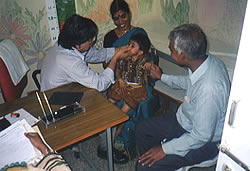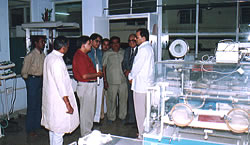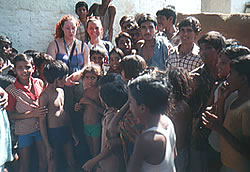Background
Dr B.K.Sharma, the inspiration behind this work, is a Paediatric Surgeon currently working in the British NHS. Born in Morena, India, the son of a teacher, he was educated at Morena, Gwalior and Bombay in India and later in England. Having seen and experienced the sufferings of poor people as one of them, but fortunate to have gone out and find sucess in the western world, he wanted to establish a hospital back in his hometown of India. His vision has been to set up an institution which could provide health education and high quality medical services to the under privileged section of the society especialy to poor, needy, destitute and disabled children there, the most neglected ones.

Dr Sharma, hard at work
Gwalior and Chambal region (population of nearly 11 million, some 90% rural and remote cut off from urban stream) is one of the least developed areas in central India, rendered further backward by centuries-old dacoity problems, exploitation of lower strata and land eroded by chambal and sindh ravines, where farming alone has been and is at present the main occupation of its people. Mismanagement and corruption at all levels worsen the scenario.
The health profile of rural population is pathetic especially of rural women and children. The delivery system is atrocious. People are not aware of their health needs, the importance of hygiene, sanitation and family planning etc. Most of the villages are bereft of medical facilities, deaths occuring due to non-availability of doctors and even ordinary medical care, even at block level where Government-run primary health centres remain unmanned. Often women and young girls deliver babies and breath their last in tractor trolleys on way to a health centre or hospital. Infants and children die for the lack of proper diagnosis. Malnutrition is rampant, leading to many chronic diseases otherwise preventable. Poor hygiene and sanitation with impure water-born infectious diseases contribute to numerous deaths. Xerophthalmia, trachoma, night blindness are some of the common preventable eye problems leading to the prevalence of blindness. Many suffer with refractive problems but can not afford spectacles or suffer from cataracts needing surgery they cannot arrange. These poor innocent people fall prey to quacks and touts working in each and every corner for lack of education and awareness. Mismanagement, bureaucracy, red tape and corruption at all levels worsen the scenario.
|
|
|
With this background the U.K. registered charity Gwalior Childrens Hospital along with Gwalior Hospital and Education Charitable Trustand Gwalior Health and Education Society (registered charities in India) were created with a commitment to serve this region. These trusts have provided health education and medical services in Gwalior and Chambal region to its urban slums, rural and remote village population for the last four years through the Gwalior Childrens Hospital, Gwalior General Hospital, Gwalior Ophthalmic Hospital and Gwalior Mobile Hospital with its six rural health centres. The hospital is equipped with state of the art facilities for neonatal care and childcare in addition to other facilities. Specialised medical camps and eye camps are being organised every fortnight in different remote village areas with emphasis on health education and prevention along with advisary and treatment services. A free OPD manned by specialists in various fields is run daily. Investigations and hospitalisation including operations are provided at minimum basic costs to meet the expenses. Poor, needy, destitute and disabled children are provided all these facilities absolutely free of cost.
The entire facility has been established without any financial support from the government of India or any other local sources. Dr. Sharma has invested from his own resources. So far, the hospital is doing a fine job, but Drs. Sharma have been providing £2000 every month from his own resources However, after the initial take off, and after about two years of survival on its own, the hospital is finding it difficult to meet operation and maintenance costs.


































